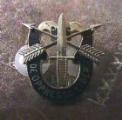While I realize that "write doctrine" is arguably the principle task of the Regular force in peace; we need to ask who has the principle task of "read and employ doctrine," and tailor the doctrinal products to that audiance.
Mostly doctrine is for students and higher level staffs. While, as Ken points out, the bulk of the force is at BN and below; I doubt highly that that is the bulk of the doctrine audance.
What the guys and gals at that level need are usable products that convert doctrine to the environment that they will be expected to operate in. Pocket guides that help Platoon leaders and Squad leaders gain effectiveness through the experiences of others.
Could we use less doctrine? Undoubtedly.
Should we attempt to achieve this by stripping the life out of what is already dry reading to begin with, in some effort to make one size fit all? I think that would be a disaster.
Remember, the historic strength of the American warfighting force has always been that the warfighter himself was a draftee or volunteer brought on specifically to fight the war, and who had probably never been within 10 paces of a doctrinal manual. The regulars up at Division had those books and had taught them at places like Benning and Leavenworth. Doctrine shapes the operational construct, but it does not guide the fight.







Bookmarks